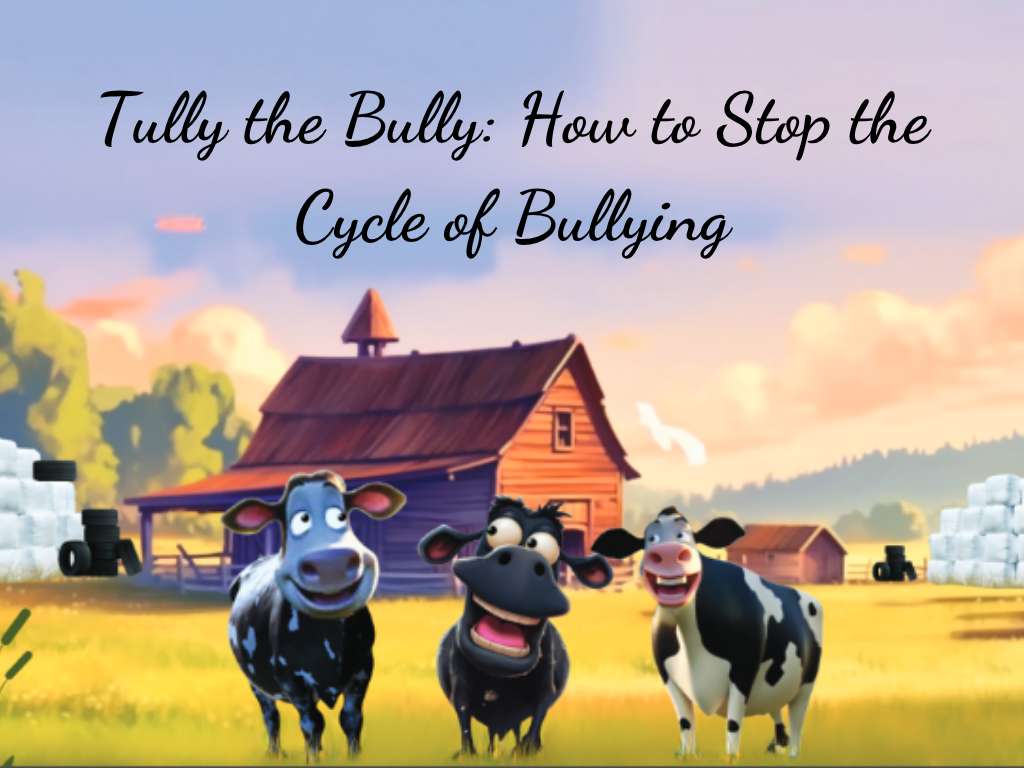In a peaceful Irish village where rolling green fields meet a happy dairy farm, a small Friesian calf named Milkshake learns that kindness can change even the hardest of hearts. Wendy Anne Hunt’s The Milkshake Chronicles: Tully the Bully is more than just a fun story about a farm. It also makes you think about how empathy, courage, and forgiveness may stop bullying.
A Happy Farm, but an Unhappy Arrival
The cows at Happy Acres Farm are fun to be around, and the farmer calls them “girlies” with love. Young Milkshake stands out among the herd because she is so cheerful and kind. There are many exciting things to do on the farm, like playing in the green fields and laughing with Farmer O’Brien’s son Aidan, who is always asking questions.
But things change when Tully, a big Black Angus cow, shows up. Tully makes her presence and her temper clear as soon as she stomps into the paddock. She cuts in line when it’s time to eat, glares at anyone who gets too close, and even throws a flying cow patty at Milkshake to make her feel bad. The herd, which used to get along well, is now unsettled and doesn’t know how to deal with this sudden rush of anger.
Looking Past the Meanness
At first, Tully seems like a typical bully: he’s bigger, louder, and wants to scare people. Farmer O’Brien, on the other hand, softly tells his son Aidan and the readers that there is more to the story. Tully was bullied on another farm before this one. She was injured and scared, so she chose to hurt others before they could hurt her.
This new information changes the whole conflict. Hunt doesn’t just call Tully “the bad cow.” Instead, he wants kids to see the anguish underlying her actions. It reminds us that bullies frequently have their own scars, and understanding what they’re going through might help us feel sorry for them.
A Brave Invitation with Courage and Boundaries
Hunt makes it clear that compassion doesn’t entail being passive, even though empathy is crucial. Milkshake is afraid, but with help from Mrs. Udderly, the wise grandmotherly cow, she learns how to set limits. She needs to explain Tully, in a calm but clear way, that what she is doing is not appropriate.
Then comes the bravest thing of all. Milkshake doesn’t want retribution or to leave; instead, she wants to include others. She asks Tully to play her favorite game, Capture the Salt Lick. Tully says yes, which surprises the herd. Her rage goes away as she plays and makes friends. By the end of the day, people have said they’re sorry, laughter has returned, and a new friendship has been made.
Hunt imparts an important lesson with this resolution: being strong and making friends might be more powerful than getting back at someone. Kids learn that being brave and being nice are not opposites; they go together.
Helpful Tips for Families
The novel is funny and heartwarming, which keeps young readers interested. Tully the Bully is also a helpful tool for parents and teachers. At the end of the book, Hunt gives a “Christian Response to Bullying,” which includes step-by-step tips like:
- Telling a bully to cease in a calm voice.
- Asking reliable adults for aid when you need it.
- Helping people who might be the targets of mean behavior.
- Remembering how valuable and important each child is.
These recommendations show families how to use what they learned from the book in school, on the playground, and in everyday life.
Fun That Drives Home the Point
Hunt adds fun extras to keep the learning light and interesting. These extras turn reading time into family time. Kids can laugh at cow jokes, learn strange facts about farms (such how cows can swim), and even make fun milkshake recipes like the “Cow Patty Fudge Chip.” Character-building tasks inspire kids to do modest acts of kindness, like delivering compliments or letting someone new join a game. This helps them practice what they’ve learned.
The participatory parts of the book make it great for classrooms, church groups, or quiet nights at home. They make a serious topic into something fun and full of love.
A Writer with Heart
Wendy Anne Hunt writing is both warm and smart. She has a degree in sociology and a minor in religious education from The King’s College. She has a profound commitment to faith-based principles and a strong grasp of how people act. Her husband Kevin, who grew up on an Irish dairy farm, gave her the real farm elements that make Happy Acres come to life.
Hunt considers her writing “redemptive writing” because she wants to write stories that are fun to read and help people feel compassion and optimism. With Tully the Bully, she does just that: she gives families a story that kids love and adults can use to deal with problems in the real world.
Why This Story Is Important
Bullying is still a big worry for kids, parents, and teachers all across the world. Tully the Bully is different because it shows that even the biggest bully may be harboring a hurt heart. It also shows that kindness, bravery, and inclusiveness can change not just one relationship, but an entire community.
Tully the Bully is more than just a bedtime story. You can get it today at Sawdust Publishing and Amazon. It’s a funny handbook to empathy that includes cow jokes and creamy milkshake recipes. This wonderful book teaches us all that forgiveness is not a sign of weakness and that love can win the day, even in a busy barnyard. It can be read aloud at home or discussed in class.
